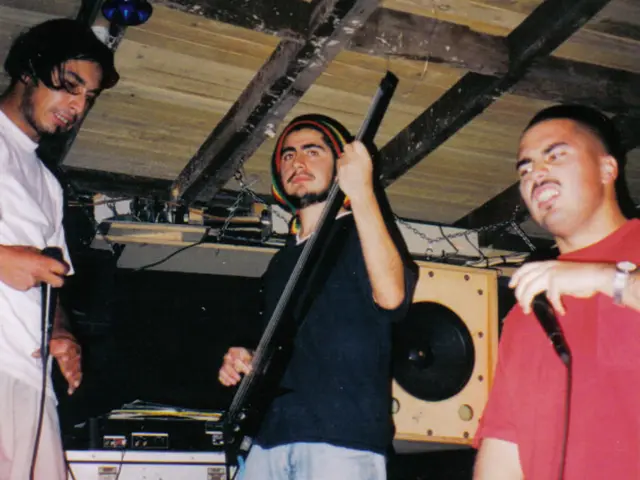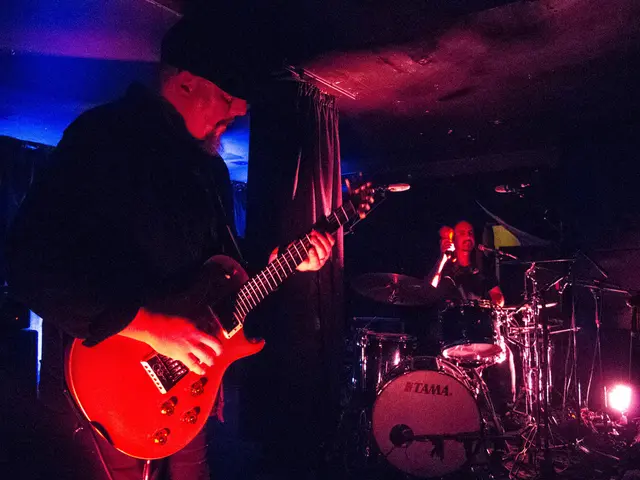Financing for Alzheimer's research from NIH in doubt, stalling ongoing experiments
A couple, Zahydie Burgos Ribot and Francisco Rios, are embarking on a journey to tick off destinations from their travel bucket list and cherish moments together. Their adventure takes them to diverse locations such as Alaska and, next in line, Niagara Falls. Ribot explained their approach: "We're choosing to live every single day with a lot of intention."
Due to early-onset Alzheimer's disease diagnosed in Rios at age 46, they're racing against time. His diagnosis has put a spotlight on the importance of ongoing research, especially with the looming threats to federal funding. The Trump administration has been restructuring the US Department of Health and Human Services, causing hundreds of research grants under the National Institutes of Health (NIH) to be abruptly cancelled or left in limbo. In March, 14 of 35 Alzheimer's Disease Research Centers had their funding put on hold.
The NIH claims that the pause was due to grant proposals containing language pertaining to diversity, equity, and inclusion (DEI), as well as concerns regarding antisemitism. HHS spokesperson Andrew Nixon expressed the NIH's commitment to research and ensuring that grant proposals align with non-discriminatory, merit-based practices, but Ribot finds the situation alarming: "These are critical data that inform not only prognosis but also the trajectory of the disease and future treatments."
Rios has been participating in a clinical trial at Washington University in St. Louis for the Alzheimer's drug Leqembi paired with experimental therapy E2814. This treatment has helped curb his memory loss and cognitive decline. However, the funding for this trial hangs in the balance, causing both Rios and Ribot to worry about his future participation in the study.
With more than a dozen Alzheimer's disease research centers waiting for their federal funding to be renewed, the uncertainty surrounding funding is a cause for concern. Dr. Michael Greicius, professor of neurology at Stanford University, is among those waiting for a funding decision, which could have an impact on hiring new research coordinators and starting research projects. While he understands the need for fiscal responsibility, Greicius emphasizes the non-political nature of Alzheimer's disease, stating, "It's so common. Almost everyone either has a relative in their family or at least has a friend who has a relative that's been affected by Alzheimer's disease."
As the fate of Alzheimer's disease research funding remains uncertain, potential funding cuts may delay the development of impactful Alzheimer's treatments and make the release of software like Dr. Richard Isaacson's RetainYourBrain uncertain. Supporters of funding cuts argue for reducing "wasteful spending," but the high cost of Alzheimer's to the healthcare system, estimated at nearly 1 in every 6 Medicare dollars last year, suggests that investing in Alzheimer's research could ultimately save money.
In the face of these challenges, researchers like DeCarli continue to fight for the reinstatement of funding for critical studies such as the Clinical Significance of Incidental White Matter Lesions on MRI Amongst a Diverse Population with Cognitive Complaints (INDEED) study, whose funding was abruptly terminated when the NIH cancelled grants related to DEI. "When these studies are terminated, an opportunity is lost to advance science," DeCarli stated.
While federal funding decisions impact their future, Ribot and Rios are focusing on the present, making every day count as they fulfill their travel goals. As Ribot put it, "Even when we cry, we laugh. Even when we are in despair, we have hope. We're not going to let this disease rob us of our present."
- The couple, Zahydie Burgos Ribot and Francisco Rios, are living intentionally, cherishing each moment.
- Rios was diagnosed with early-onset Alzheimer's disease at age 46.
- The diagnosis highlighted the importance of ongoing research, especially amidst threats to federal funding.
- The Trump administration's restructuring of the US Department of Health and Human Services caused research grants to be cancelled or put on hold.
- In March, funding for 14 Alzheimer's Disease Research Centers was put on hold.
- The NIH claimed the pause was due to concern over grant proposals containing DEI language and antisemitism.
- HHS spokesperson Andrew Nixon assured commitment to research and merit-based practices.
- Ribot finds the situation alarming, citing the critical data such research provides for prognosis and treatment.
- Rios is participating in a clinical trial for the Alzheimer's drug Leqembi and experimental therapy E2814.
- Funding for this trial hangs in the balance, causing concern for Rios and Ribot.
- Over a dozen Alzheimer's disease research centers are waiting for their funding to be renewed.
- Dr. Michael Greicius, a professor of neurology at Stanford University, is among those waiting for a funding decision.
- The uncertainty surrounding funding is a cause for concern for researchers.
- Greicius emphasizes the non-political nature of Alzheimer's disease, stating it affects many families and friends.
- Potential funding cuts could delay the development of impactful Alzheimer's treatments.
- Supporters of funding cuts argue for reducing "wasteful spending."
- However, the high cost of Alzheimer's to the healthcare system suggests investing in Alzheimer's research could save money.
- Researchers like DeCarli continue to fight for the reinstatement of funding for critical studies like INDEED.
- DeCarli states that terminating these studies closes opportunities for science to advance.
- As federal funding decisions impact their future, Ribot and Rios focus on the present, fulfilling their travel goals.
- Ribot believes that even in despair, they will find hope and not let the disease rob them of their present.
- Neurodegenerative diseases, including Alzheimer's, are chronic diseases that require ongoing research.
- Other chronic diseases include cancer, respiratory conditions, digestive health issues, eye health disorders, hearing problems, and cardiovascular health concerns.
- Health and wellness is not limited to physical health; mental health is equally important.
- Therapies and treatments for various medical-conditions yield improved health outcomes.
- Fitness and exercise contribute significantly to overall health and well-being.
- Alzheimer's disease is one of several neurological disorders, such as autoimmune disorders and Parkinson's disease.
- Climate change impacts the environment and can influence the incidence and progression of certain health issues.
- Manufacturing can lead to health risks associated with air and water pollution.
- Industries like finance, energy, retail, transportation, cybersecurity, and technology all have roles in shaping our overall lifestyle.
- Health-conscious individuals prioritize self-care, seeking advice on health, fitness, and nutrition from experts, books, and various online platforms.








